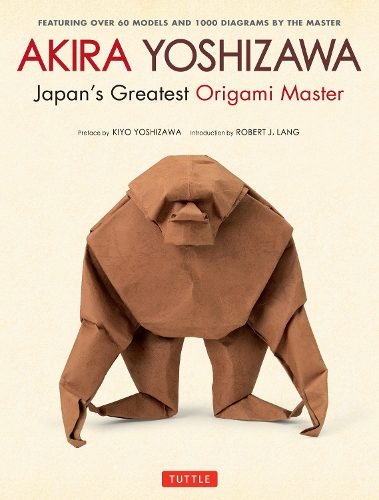
Akira Yoshizawa, Japan's Greatest Origami Master: Featuring over 60 Models and 1000 Diagrams by the Master
(Hardback, Second Edition)
Publishing Details
Akira Yoshizawa, Japan's Greatest Origami Master: Featuring over 60 Models and 1000 Diagrams by the Master
By (Author) Akira Yoshizawa
Introduction by Robert J. Lang
Preface by Kiyo Yoshizawa
Photographs by Kazuo Hamada
Tuttle Publishing
Tuttle Publishing
11th October 2016
12th December 2016
Second Edition
United States
Classifications
General
Non Fiction
736.982
Physical Properties
Hardback
192
Width 229mm, Height 305mm
Description
Master origami artist Akira Yoshizawa was a true innovator who played a seminalrole in the rebirth of origami in the modern world. He served as a bridge betweenpast and presentbetween the ancient traditional craft and the development oforigami as a modern practicein terms of inventing new techniques and inpreserving the traditional Japanese forms. In fact, the notational system ofdiagrams widely used today to indicate how models are folded was largely inventedby him. Above all, Yoshizawa was responsible for elevating origami to the status ofan art form.
This beautiful book is the fi rst comprehensive survey of the extraordinary work ofAkira Yoshizawa. In addition to 60 models from his private collection, it featuresover 1,000 original drawings by the artist, and English translations of his writings inJapanese on origami, all of which are published here for the very first time.
Projects include:
Children's Day Pinwheel,
Butterflies of Every Kind
Carp Banner and Helmet
Fairy Tale Crowns and Caps
The Lion Mask
Tengu Masks
and more!
Reviews
"Akira Yoshizawa was, and still is, the acknowledged master of modern origami. In this magnificent book, you can discover his ideas, philosophy and artistry, and you can fold his designs from his own meticulous instructions." --David Brill, author of Brilliant Origami and vice president of the British Origami Society
"As I fold, Yoshizawa Sensei is telling me 'Too much detail, let the paper express the essence.' He is trying to let me hear the silence in my creations. I can only dream of succeeding like he did." --Bernie Peyton, author of Eco-Origami and curator of Origami Universe
"Akira Yoshizawa is known as the 'Grandfather of Origami' and with good cause. His revolutionary work set the foundations for modern origami and his quest to capture the true essence of the subject has led to a far deeper understanding of what is truly important about origami. His models are not highly technical, but even expert folders find it almost impossible to capture the subject as well as the Master. His influence on origami cannot be overstated and he is revered by the creative giants of the paper-folding world who have followed in his footsteps." --Nick Robinson, professional artist and author of many best-selling books on origami
Author Bio
Born in 1911, Akira Yoshizawa is the father of modern origami. The publication of his first collection of models in the early 1950s caused a major sensation. In 1954, he founded the International Origami Centre in Tokyo. In 1955, his original works were exhibited for the first time at a show in Amsterdam, an enormously successful event that introduced him to the West. It was during these years that he came up with a system of notation based on a series of symbols and graphic signs indicating various types of folds and thus created a method that was later adopted by many origami artists and is still in use today. In subsequent decades Yoshizawa folded and taught origami, published books on the art, and participated in innumerable events on an international scale. As his fame spread throughout the world, he came to be seen as the most distinguished representative of the art, a pioneer of many techniques used in modern origami. Yoshizawa died in 2005, on the day of his 94th birthday.
Preface:
Kiyo Yoshizawa married the Master in 1956 and became his manager from that point on. After her husband's death, she worked on preserving and disseminating his legacy throughout the world, directing and supporting the International Origami Centre with her constant activity, and passing down the artist's original techniques, including wetfolding, one of his inventions. In recent years, she has organized various exhibitions abroad to help the broad public understand Yoshizawa's works even better.
Introduction:
Born in 1961, Robert J. Lang has been deeply involved in origami since the age of six, when he discovered several instructions for traditional designs in a library book. This early beginning ignited a lifelong passion for the art. He is now considered one of the leading origami artists in the world, with hundreds of original creations to his credit, as well as 14 books authored, co-authored, or edited on the art, numerous articles and instructions published in origami periodicals, and he regularly lectures and teaches origami at conventions and workshops around the world. He has a Ph.D. in Applied Physics from Caltech, and has used his mathematical and engineering training to advance origami, both artistically and in its applications to science and technology. In his origami career, he has drawn from many sources and influences, not least of which is the work of Yoshizawa-sensei. Yoshizawa's techniques, both technical and artistic, played a major role in Lang's own origami evolution, and he is honored to be able to contribute to this work of the master.
Photographer:
Born in 1958 in the prefecture of Chiba, Kazuo Hamada graduated from the Tokyo School of Photography and began freelancing in 1984. In 1990 he founded his own photography studio, and today he collaborates with Tokyo's prestigious Pacific Press Photo Agency. He has won the 21st Japan's Advertising Photographers' Association Award (APA) and other important prizes. His works have been exhibited in many photography exhibitions in Japan and abroad.
